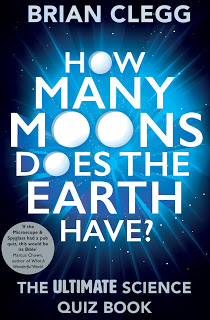

| Online: | |
| Visits: | |
| Stories: |

| Story Views | |
| Now: | |
| Last Hour: | |
| Last 24 Hours: | |
| Total: | |
Multiple choice moons
By Brian Clegg
A couple of newspaper websites have recently published quizzes based on How Many Moons does the Earth Have.
The first was the Mail Online, which used a rather manual approach of a list of possible answers for each question, then the answers further down the page. I wasn't overwhelmed by this version, which you can see here, in part because they didn't have any useful link to the book. Newspapers tend not to pay for these kinds of extract, but this is on the basis that they make it easy to buy the book.
Perhaps most entertaining here is the collection of almost uniformly negative comments, often complaining that the questions were 'general knowledge, not science.' I simply don't understand this moan: science often is general knowledge, and all the questions were science/tech based.
The second version appeared on the website of the now internet-only Independent (although you can still get the excellent i newspaper in paper form), and I much preferred it. As you can see, they took a much more visual approach and gave multiple choice 'click to answer' questions that took advantage of the format.
What both miss is what is, to me, the most important feature of the book – that it doesn't just give answers, but spends a page expanding on them. So, for instance, my answer about how much salt in the sea was denounced as a trick question on the Mail website – but if you follow through the page in the book, my answer is a perfectly logical one.
Whether or not these online quizzes generate any interest in the book, it's still an interesting experience.
Now Appearing is the blog of science writer Brian Clegg (www.brianclegg.net), author of Inflight Science, Before the Big Bang and The God Effect.
Source: http://brianclegg.blogspot.com/2016/04/multiple-choice-moons.html



